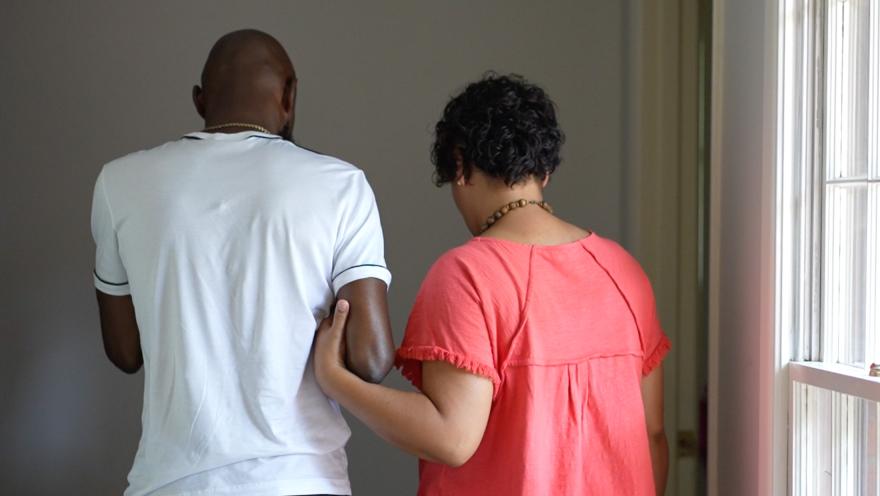Today marks the first day of National Family Caregivers Month, a time to recognize and honor the tremendous contributions of family caregivers. Finding ways to help and show support for the caregiver in your life can make a huge difference for them, and for you.
Only those living through the experience first-hand truly understand the challenges of being a full-time caregiver, particularly for someone living with ALS. The ability to complete basic daily tasks can be overwhelming and the need for help is great.
“We've always been pretty independent people and sort of handled our own most of our lives,” shares Kristina Woody, full-time nurse, wife, mother and caregiver to her husband Lamar who is living with ALS. “So now, needing a lot more assistance has definitely been a humbling experience for us.”
Kristina admits the challenge of living with ALS every day is hard. “It's not like a knee surgery, and for a couple of weeks, people can bring you casseroles and help you out,” she says. “And as things progress, it all looks very different, sometimes from day-to-day, so the help that's needed is a lot.”
Fortunately, Kristina and Lamar have found a great deal of support from their friends, family and community. She says her circle consists of “the ones that jump in and do whatever, whether that's picking up our daughter, or just sitting here, kind of as emotional support for Lamar or for me.” Sometimes it’s the little things that mean the most.
To help spread awareness of caregiver needs and initiate the conversation about the many ways you can help families impacted by ALS, the Association has put together these top ten tips to think about:
Stay in touch.
ALS is a journey, find ways to be present all along the way.
A simple card, email, text, phone call or visit can mean a lot.
Do the little things.
Living with ALS can be overwhelming, making daily tasks challenging.
Bring a meal, walk the dog, mow the lawn or take out the trash.
Include the person living with ALS in activities.
ALS can feel very isolating for everyone involved, especially the person who is diagnosed.
Encourage them to keep participating in daily life, continue with hobbies, and engage with friends and family.
Be specific when offering help.
Life is busy, be honest about what you can and can’t do to help.
Run an errand, drop off a special treat, or help drive kids around to activities.
Learn about ALS.
Do what you can to understand the disease and what to expect.
Read up on the details, attend a support group, or meet with your local ALS Chapter.
Keep showing up.
The ALS journey is different for everyone.
Let them know you are there and will continue to be through the entire journey. And do it.
Offer a shoulder to lean on.
ALS can create stress for the entire family.
Be sure to offer your support and friendship and be present when you’re needed most.
Build a network and coordinate support.
Providing the best quality of life for people living with ALS and their families can take a village.
Recruit friends and family members, assign specific tasks and schedules, set up a Care Connection group.
Keep all family members in mind.
Remember, ALS impacts EVERYONE in the family, regardless of age.
Spread the love. Offer to take the kids to activities and help out with elderly relatives.
Join the Fight.
We have pledged to do whatever it takes to make ALS a livable disease until there is a cure.
Whether it's volunteering, fundraising, donating, or becoming an advocate, there are so many ways to get involved in the broader fight against ALS.
Caregiving for someone with ALS has a broad and lasting impact, in both daily life and long-term well-being. Download this infographic about caregiving and share on your social platforms to support a caregiver you know.
We’ll be sharing more in the coming weeks about the Woody family’s journey with ALS and what their everyday life is like living with this disease, and we hope you will follow along and share with your family and friends.
To learn more about how you can get involved in the fight against ALS, visit our website HERE.
To continue to follow stories about people living with ALS in the community and learn more about the disease, subscribe to receive our weekly blogs in your inbox HERE or follow us at als.org/blog.


Comments
How long to visit?
My father had ALS at age 44 want some information about it ALS please
Hello Karim, we are sorry to hear about your father's diagnosis. There is tons of information on our website with information to help you understand and navigate the disease. Please feel free to go here to learn more: https://www.als.org/understanding-als.
Join the conversation. Please comment below.